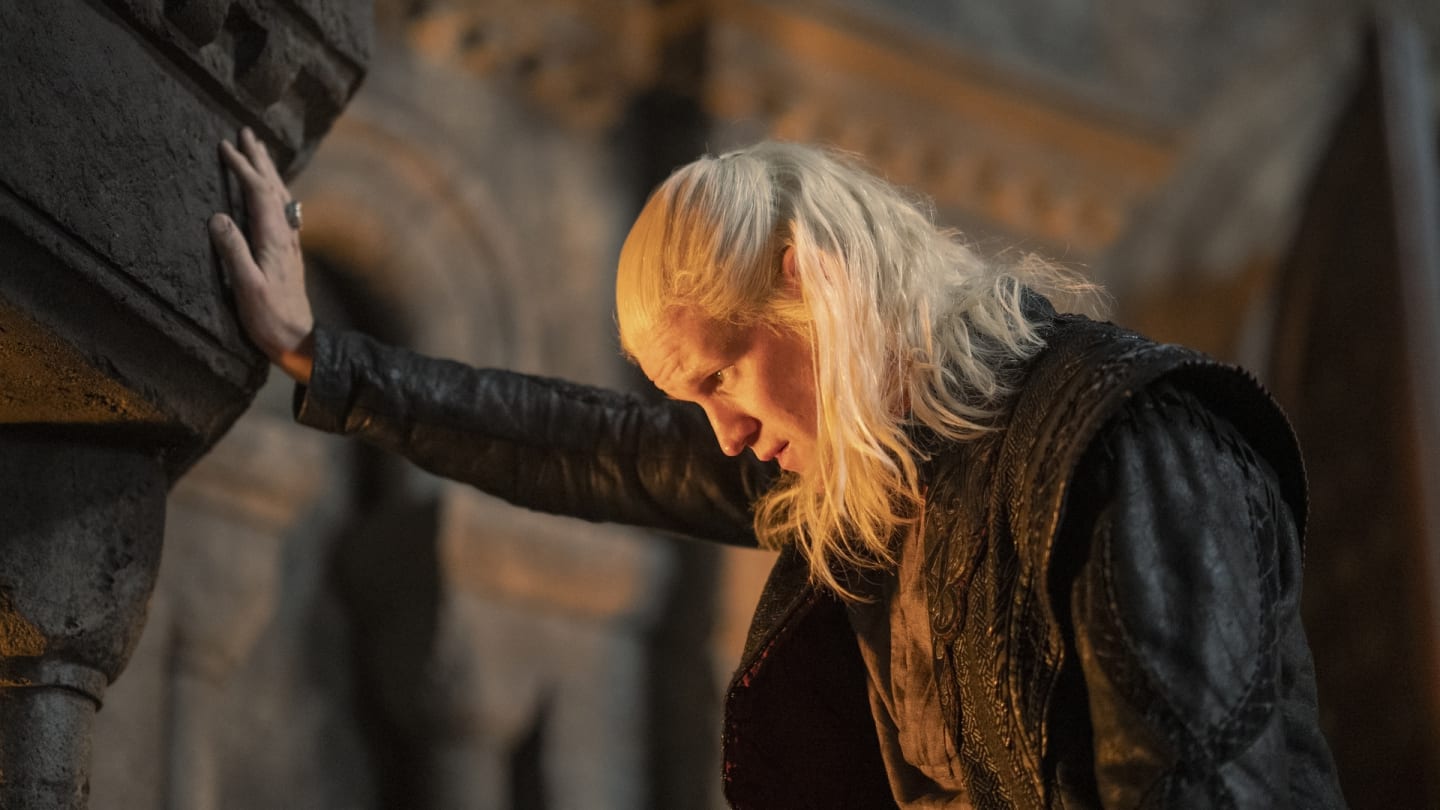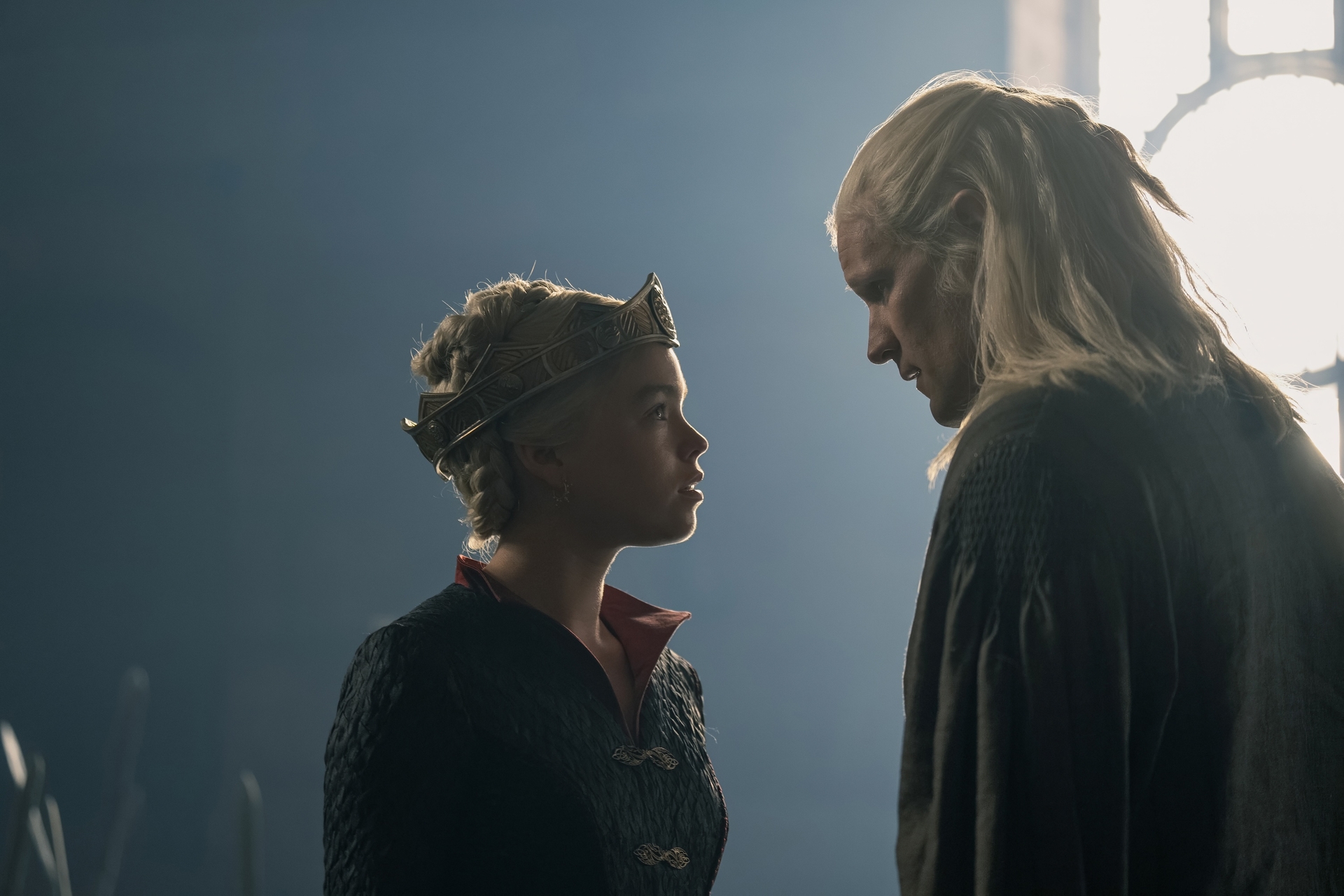
As a long-time fan of George R.R. Martin’s A Song of Ice and Fire series, I was thrilled when HBO announced the creation of House of the Dragon, focusing on the Targaryen dynasty. Daemon Targaryen, played by Matt Smith, was a character I had always found intriguing with his complex personality, charm, and dangerous allure.
Towards the finale of the initial season of “House of the Dragon,” it is revealed that Rhaenyra Targaryen’s (Emma D’Arcy) young son Lucerys Velaryon (Elliot Grihault) has met his demise at the hands of her nephew Aemond Targaryen (Ewan Mitchell). Aemond’s older brother, Aegon (Tom Glynn-Carney), is challenging Rhaenyra’s claim to the Iron Throne. As the devastating truth sinks in, we witness Rhaenyra from behind, her body slumped with sorrow and despair. However, her resolve soon hardens, and she slowly turns to face forward, her countenance etched with unbridled fury. In the upcoming season, anticipate Rhaenyra to let out a fiery roar.
During the commencement of the new season in June, however, that significant event failed to materialize. Rhaenyra grieved deeply for her son in the initial episode and has maintained her poise since then, meticulously preventing any potential conflict among the Seven Kingdoms. It was Rhaenys (Eve Best) who initially proposed representing Rhaenyra in battles, a suggestion that Rhaenyra eventually agreed to. Despite her intriguing storyline, we have yet to witness the intense and passionate scenes foreshadowed by the dramatic conclusion of season 1.
An intriguing parallel can be drawn to Rhaenyra’s husband (and uncle) Daemon Targaryen, portrayed by Matt Smith. In the initial installment, viewers were introduced to Daemon as a man capable of beheading someone publicly for trivial reasons. He went on to marry his own niece and assaulted her during an argument long ago. Daemon’s atrocities were inhumane, yet he occasionally displayed compassion towards his brother or Rhaenyra, leaving audiences with conflicting feelings. These contrasting actions, combined with Smith’s riveting portrayal, made Daemon the most captivating and intriguing character of the first season.
In season 2, the passion that once burned brightly in Daemon seemed to fade away. He initiated the dispute by dispatching assassins to the Red Keep with orders to eliminate Aemond. This was a move typical of Daemon. However, the assassins bungled their mission and ended up taking the life of young Prince Jaehaerys instead, igniting an explosive confrontation between Daemon and Rhaenyra over his reckless and self-centered behavior. Following this incident, Daemon retreated to Harrenhal’s ruins, where the pace had noticeably decreased.
Daemon disguises his true intention of seizing the Iron Throne for himself while supposedly helping Rhaenyra raise an army at Harrenhal. However, his tactics are questionable. In the latest episode, he aligns with House Blackwood in an attempt to force House Bracken into joining his side. Daemon orders the Blackwoods to inflict war crimes upon the Brackens, which inadvertently pushes them towards alignment. Yet, this action repels another faction of Riverlords who refuse to support him.
It was surprising and difficult for me to accept the scenario in the previous episode. Previously, we witnessed Ser Criston Cole (Fabien Frankel) leading an army through the Crownlands, gaining allegiance from houses loyal to King Aegon, and punishing those who refused. After executing the head of House Darklyn, the surviving Darklyn men were compulsorily drafted into Criston’s ranks. However, when Daemon attacks what he perceives as a rebellious house, a group of Riverlords express disapproval. Their attitude appears naively optimistic in a realm like Westeros, which we have come to understand is governed by force. Even if these Riverlords have grown accustomed to tranquility, their perspective seems unrealistically hopeful.
In George R.R. Martin’s book “Fire & Blood,” it is not mentioned that Daemon faces any challenges in assembling an army in the Riverlands. He joins forces with House Blackwood and makes a threat to torment the families of opposing Bracken lords, resulting in their swift surrender. The remaining Riverlords then follow suit.
The creators of “House of the Dragon” intentionally altered certain aspects of the story. They inserted dream scenes depicting Daemon’s past regrets and fabricated challenges for him to face. Consequently, a character portrayed as menacing and capable now seems foolish and inept, while a plotline anticipated to be thrilling has turned out to be slow and perplexing. How did this unfold?

Why is Daemon like this now?
The writers might have changed direction for several reasons. One plausible explanation is that Matt Smith is an exceptional actor and the most recognized face in the ensemble, hence they aimed to provide him with a more substantial role. In the novel, his character’s arc is rather simple; he essentially marches through the Riverlands. To add depth to this storyline, the showrunners chose to have him challenge Rhaenyra for the throne and discover that he is not cut out for it as effectively as he thought.
As a passionate gamer, I’ve found this latest turn in the game disappointing. Instead of veering off course, I would have preferred the writers to stay truer to the source material. I could have used less of Daemon’s presence and more screen time for intriguing characters like Helaena Targaryen (Phia Saban) or Otto Hightower (Rhys Ifans). Alternatively, I would have appreciated a deeper exploration of the relationship between Jacaerys Targaryen (Harry Collett) and Baela Targaryen (Bethany Antonia). Personal preference, your mileage may vary.
I remember Sara Hess, the executive producer, sharing her surprise during an interview towards the end of the first season. She couldn’t comprehend why fans had developed such strong affection for Daemon, whom she described as “Internet Boyfriend,” leaving her puzzled. She acknowledged Matt’s charm and superb acting skills in portraying the role, but questioned Daemon’s suitability as a partner, father, or brother based on the show. She exclaimed, “Really? What makes him a good partner, father, or brother to anyone? He’s not like Paul Rudd.”
During an interview, I found it intriguing but unusual when she made this statement off the cuff. Throughout history, fiction has captivated audiences with complex characters who exhibit violent, unpredictable, and dangerous behaviors. This element of surprise is what makes a great story. Why do you believe that the vengeful and heartless Heathcliffe from “Wuthering Heights,” first published in 1847, remains a significant literary figure? We’re drawn to villains, even when they possess both good and bad qualities. Characters like Daemon Targaryen exemplify this blend of morality, making them all the more intriguing.
In season 2, I noticed that Daemon’s menacing demeanor became less intense. He warned the House Bracken that he would destroy them if they didn’t align with him, but when they refused, instead of carrying out the threat himself, he recruited Willem Blackwood to carry out his nefarious plans in a convoluted and intricate manner, which seemed unusual for Daemon.
The show appears to be maintaining Daemon’s reputation for wrongdoing while avoiding depicting him committing any actual acts of wickedness. This ambiguous portrayal was also used for characters like Aemond Targaryen and Alicent Hightower in the first season. However, instead of intending to harm or misunderstanding situations, it seems Daemon is being punished even when he manages to behave badly. I find this narrative device as unengaging and aggravating as it was before.
It’s possible that the writers of “House of the Dragon” recognized Daemon’s growing popularity and felt the need to soften his edges to make him a more respectable character deserving of such admiration. They may have wanted to guide Daemon through a personal journey to reduce his problematic traits, making him less controversial for fans. In contrast, “Game of Thrones” acknowledged that fans are drawn to complex and challenging characters, but it appears that “House of the Dragon” aims to keep its leading characters within acceptable boundaries, perhaps due to concerns over fan reception or sending the wrong message.
If this situation holds true, I strongly urge the authors to reconsider their approach. By making characters one-dimensional in this way, they become less captivating; instead, allow them to embody despicable, admirable, revolting, and noble traits. We’ll be drawn to them because of their complexity.
Perhaps there’s a deeper meaning to Daemon’s story in “House of the Dragon” season 2 that I’m currently missing. Showrunner Ryan Condal is particularly proud of this plotline, having felt they successfully concluded it. However, my current reaction isn’t favorable – I’m feeling frustrated and disengaged instead of engaged and excited after watching the latest episode.
Read More
- Clash Royale Best Boss Bandit Champion decks
- Vampire’s Fall 2 redeem codes and how to use them (June 2025)
- Mobile Legends January 2026 Leaks: Upcoming new skins, heroes, events and more
- M7 Pass Event Guide: All you need to know
- Clash Royale Furnace Evolution best decks guide
- Clash Royale Season 79 “Fire and Ice” January 2026 Update and Balance Changes
- Clash of Clans January 2026: List of Weekly Events, Challenges, and Rewards
- World Eternal Online promo codes and how to use them (September 2025)
- Best Arena 9 Decks in Clast Royale
- Best Hero Card Decks in Clash Royale
2024-07-15 07:42